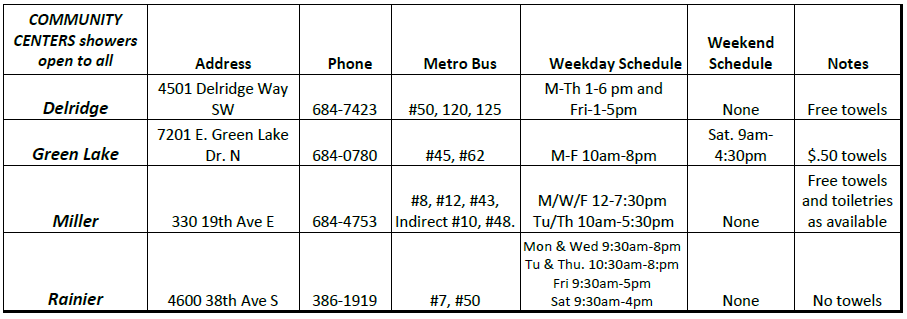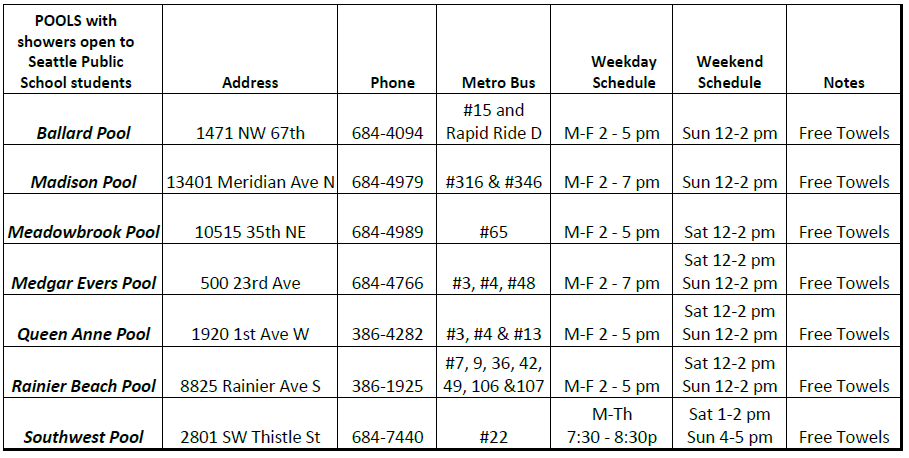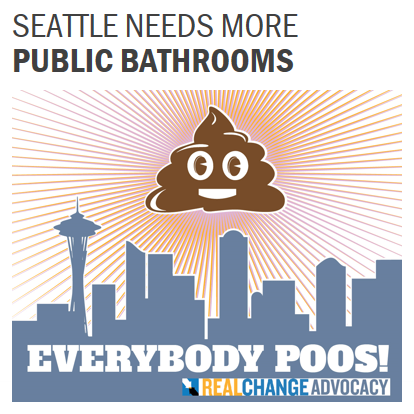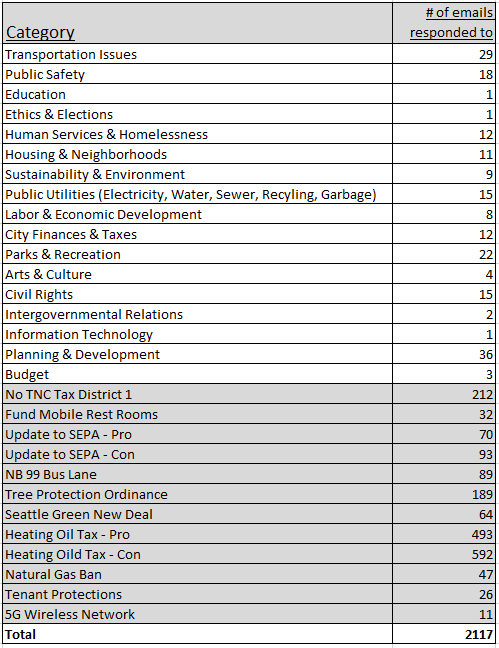Budget Update; Public Hygiene Resources; Hiawatha Play Area; Sidewalk Maintenance; SEPA Update; Constituent Emails; Office Hours
This Week in the Budget
Last week the Budget Committee did not meet. Councilmembers had a deadline on Thursday, October 10 to identify issues to be included in staff memos for the Budget Deliberations and Issue Identification. These meetings began on October 16 and they continue through October 22nd.
At these meetings Council Central Staff present issues they have identified in the Mayor’s Proposed 2020 budget; the staff memos have a separate section for issues identified by Councilmembers. The issues can be identified at a high level, and for these meetings don’t require specific proposals. Agendas and materials are available at the Budget Committee agenda page.
Specific proposals will form the “Council Budget Actions” meetings of the Budget Committee and need to be submitted by October 23rd. Council Budget Actions will be presented from October 29 to November 1.
The second budget public hearing is scheduled for Tuesday, October 22nd at 5:30 p.m. in the City Council Chambers.
Here’s a link to the Budget Committee schedule. Budget Committee meeting agendas are available here. A description of the Council’s budget process is linked here.
Parks Opening Access to Showers & Budget Proposals to Increase Public Hygiene Resources!
Seattle Parks & Recreation (SPR) has announced that they are opening up additional showers and restrooms to Seattle Public School students and their immediate family. The newly available showers are at the seven SPR pools. This is in addition to four community centers across the city that already make showers available to anyone who needs one.
I appreciate SPR’s efforts to make hygiene services more available to youth and families in Seattle. This resource will especially help students experiencing homelessness. A new report by Schoolhouse Washington shows that there were 4,368 Seattle Public School students experiencing homelessness in 2018, 88% of whom are students of color. Schoolhouse Washington’s new data dashboard shows negative outcomes in attendance, language arts and math proficiency, and graduation rates of students experiencing homelessness—this data validates the challenges a student experiencing homelessness faces, even if they are “doubled-up” i.e. living with family and/or friends with resources not meant to accommodate several people.
In opening City facilities we can use existing resources to address the long-term impacts of homelessness.
For the past year, I have been promoting recommendations in a report of the City Auditor that I requested on the Navigation Team’s work to address unauthorized encampments. The Auditor’s recommendations are for SPR to open our shower and bathroom facilities broadly to the public, especially for the goal of increasing access for people living unsheltered. This recommendation from the City Auditor makes the point that in providing no-barrier access to hygiene services for people living unsheltered we can better manage communicable diseases and other public health risks.
This week’s announcement from SPR is a happy coincidence; just this past week in the City Council budget process, I proposed opening up showers and restrooms with a common standard of care (hygiene products, towels, signage) in several other Parks’ facilities, as well as comfort stations, to increase access throughout the city.
I am also excited about another effort to increase access to restrooms that will benefit everyone in our City. Real Change’s “Everybody Poos” campaign is urging the City to adopt the Mobile Pit Stop model, which has been implemented in San Francisco and other cities, to create more places for people to use the bathroom. The Pit Stops also can be a place for people to dispose needles and pet waste, and use a staffing model to ensure safety and cleanliness that by advocates estimates is more cost effective than the self-cleaning bathrooms the City decommissioned and sold a few years ago, and the recently installed Ballard Commons Portland Loo.
Hiawatha Play Area Relocation & Renovation
Seattle Parks and Recreation is working on a relocation and renovation of the Hiawatha play area. You can participate in a quick survey here, and attend a community meeting on Friday, October 25 between 6pm and 8pm at the Hiawatha Community Center (2700 California Ave SW).
Sidewalk Maintenance Policies Resolution
Last month I proposed legislation the Council adopted regarding sidewalk maintenance policies. The resolution requests SDOT develop policy options for the maintenance of sidewalks, create a public education program on snow and ice removal responsibility, and describe how SDOT enforces snow and ice removal responsibilities, and consider ways to emphasize clearing of sidewalks within 12 hours of a snow event.
In the committee discussion, we heard presentations from Rooted in Rights, a disability rights organization. The first presentation was from a photographer who uses a wheelchair, and was in an accident on an uneven sidewalk; the second was from a disabled person who was unable to leave his residence for eight days during the snowstorm last winter; due to snow and ice on sidewalks, he was unable to access public transit.
The Council requested SDOT consider Denver’s approach on sidewalk repair, where the City offers repayment assistance and affordability discounts for property owners who qualify, and also authorizes less expensive repair methods, such as grinding and crack filling.
The Move Levy passed by voters in 2015 committed to repairing up to 225 blocks of damaged sidewalks in urban centers and villages, and completed 78 from 2016-2018, with 12.8 through June in 2019 according to the Move Levy performance dashboard.
The levy committed to 150 blocks of new sidewalks, and completed 97.6 from 2016-2018, with 23.5 through June 2019.
SEPA Update at the City
Council Bill 119600, made changes to how the City of Seattle uses its authority granted to it under the State Environmental Protection Act.
When this legislation came before the Full Council, I still had reservations about the bill. I am concerned that the Council did not receive adequate input from the Hearing Examiner. I also had concerns that so many members of the public have legitimate concerns or questions about the possible unintended consequences of this bill.
When I asked Hearing Examiner Vancil for his thoughts on this bill he wrote back (you can see the full letter here) with several thoughts. But here are some excerpts:
- Regarding the timeline established in this bill, Hearing Examiner Vancil wrote:
“I believe the proposed timeline is a blunt tool to address Council desires to ensure efficiency in the SEPA appeal process. Under most circumstances 120 days is too much time, and for those cases that take longer it is my experience that it is all parties needing more time to complete the hearing process, and not just appellants, because such cases simply need more time.”
- Regarding the delay of the MHA Hearing Examiner Vancil wrote:
“All parties, including the City, had schedule conflicts for their representatives and witnesses that delayed the conclusion of the hearing.”
- Regarding the delay of Case W-18-002 (Fort Lawton), Hearing Examiner Vancil wrote:
“that case was delayed most significantly because it originally required four days to complete, and the hearing schedule could not accommodate four days because of the MHA hearing schedule and other already scheduled hearings.”
I believe that Hearing Examiner Vancil’s observations correct the misleading narrative that appellants have inappropriately used delay tactics to delay the process. Please note that the final legislation includes an amendment sponsored by Councilmember Pacheco that reduced the timeline from 120 days to 90 days except in the case for appeals associated with a Council land use decision, which maintains the 120 timeline.
Given that the City and appellant typically agree to extend the timeline and this bill does not prohibit that, I believe that it is unlikely that this aspect of the bill will have any actual impact on the timeline.
As this legislation worked its way through the City Council, I asked Central Staff for more in-depth information regarding previous appeals. Specifically, whether the appeals made in previous years could be made under the new legislation, and the reason for those appeals.
Many have written to me to say that the adversarial SEPA appeals of City decisions, results in positive outcomes for both the City and the community, ultimately resulting in better projects. I found evidence of that to be true. I asked Central Staff to review the 54 cases that were appealed over the last ten years. 25% of those cases were amended or remanded. This means the appeals themselves resulted in changes that made the projects better. Of the 25% of cases that were amended or remanded over the last ten years, none of them would be exempted from appeal had this legislation been in place. So that’s the good news.
Further, over the last ten years of appeals, Central Staff analysis showed:
- That 2 of 32 of project actions, or development proposals, appealed would not have been required to undertake SEPA under this new legislation. In both cases the Hearing Examiner ruled in the City’s favor as it related to the SEPA issues. In one of the two cases, the appellants won on the basis of land use code interpretations (not SEPA issues).
- That 4 of 22 of non-project actions would possibly be subject to a waiver of appeals under this law. However, at least one of those cases – the University District Urban Design EIS – could have been appealed to the Growth Management Hearings Board on other grounds.
Taken together, this analysis means, to me, that though proponents have hailed the legislation as important SEPA “reform,” and opponents have decried the erosion of important environmental protections, the impacts of this bill are likely to be very modest.
Nevertheless, because of concern from the public, I sponsored two amendments to require both a. greater public engagement in the review of the impacts of this bill and additional efforts to improve the SEPA appeal process to the benefit of all parties and b. greater public engagement in the implementation of this bill.
Amendment one asks the Hearing Examiner to convene a stakeholder committee to identify opportunities to improve processes, procedures, or codes or identify any resource needs that could help to improve the hearing process, including any changes already made. (Emphasis added). This means that in the scope of the Hearing Examiner’s review it the ability to make recommendations related to CB 119600. I often remind the public that policymaking is iterative. This amendment creates an opportunity to revisit the decision made with the passage of this bill. I worked directly with Hearing Examiner Vancil on this amendment and he supported it. Amendment one passed unanimously.
The second amendment, number three, directs SDCI to report to Council on their draft administrative rules clarifying SEPA procedures before they become effective. It also requires SDCI to convene a stakeholder committee to help advise the development of rules to help improve processes and procedures. This amendment also passed unanimously.
I was disappointed that the Council did not include my amendment to require SEPA review when developers include more parking than is required, specifically in the urban centers of Downtown and South Lake Union where we have seen a huge amount of parking being built in an area of the city that is also very well served by transit. Danny Westneat wrote two articles about this which in which he reported that in 160 acres in South Lake Union there were nearly 12,000 new parking spaces planned in 2015. In 2019 he reported that Mercer at Aurora, which in 2015 was at capacity and carrying 28,000 cars on an average weekday, was now somehow carrying 38,000 cars daily – 36 percent more. By not allowing the appeal of excessive parking especially in areas well served by transit we will only see the proliferation of more vehicular traffic in areas that cannot sustain it. I was bewildered to hear support by bill proponents for the bill’s potential positive impacts to speed up projects that build housing and provide alternatives to single-occupancy vehicle travel but opposition to an amendment that could provide a tool that could result in less land being used for parking and eliminating incentives to drive.
I also want to address two items that I have heard significant concerns about.
- The ability to use SEPA to appeal economic impacts of projects.
This legislation will still allow consideration of economic impacts in SEPA review and analysis, even if the SEPA determination is not appealable. This goes far beyond what the state requires. The state does not require cities to include consideration of economic impacts in SEPA review and analysis at all. The legislation as passed continues Seattle’s long practice of studying the economic impacts of project and not-project actions.
- A concern that that SDCI has inappropriately, and in conflict with the law, not followed the code when it comes to the timeline of SEPA consideration.
The City’s practice, publishing a Determination of Non-Significance with the Master Use Permit decision, is consistent with the requirements of the law. The Master Use Permit decision relies on the Design Review board’s final decision. So, the City must wait until the design review board acts before publishing a determination of non-significance.
In closing, I want to thank those of you that reached out to me for your advocacy on this legislation. While I do not believe the City or the Council did an adequate job communicating about this legislation, public participation in the legislative process helps the Council craft better policy and certainly helps me be a better advocate for my constituents.
September Constituent Email Report
Constituent correspondence is a very important task in my office. My staff and I spend time every day helping you improve our community, whether that’s by getting you help from a city department with our constituent case management services or giving you information about legislation that the Council is considering. The unshaded categories and numbers are problem-solving emails answered in September, what I refer to above as “case management services.” The shaded categories and numbers are emails answered in September related to policy or legislation that the Council is considering.
In-District Office Hours
On October 25, I will be at Southwest Customer Service Center (2801 SW Thistle St) between 12pm and 5pm. The final meeting of the day will begin at 4:30 p.m.
These hours are walk-in friendly, but if you would like to let me know you’re coming in advance you can email my scheduler Alex Clardy (alex.clardy@seattle.gov).
Additionally, here is a list of my tentatively scheduled office hours. These are subject to change.
- Friday, November 29, 2019
South Park Community Center, 8319 8th Avenue S - Friday, December 20, 2019
Senior Center of West Seattle, 4217 SW Oregon St
Posted: October 18th, 2019 under Councilmember Herbold, Education, Homelessness, Parks and Recreation, Public Health, Transportation
Tags: Budget Committee, constituent e-mail report, disability rights, District 1, Everybody Poos, Hearing Examiner, Hiawatha, homelessness, In-District Office Hours, Mandatory Housing Affordability, MHA, Move Seattle levy, Real Change, Rooted in Rights, SDOT, Seattle Parks and Recreation, Seattle Public Schools, SEPA, Sidewalk Maintenance Policies, South Park, SPR, SPS, State Environmental Protection Act, West Seattle






